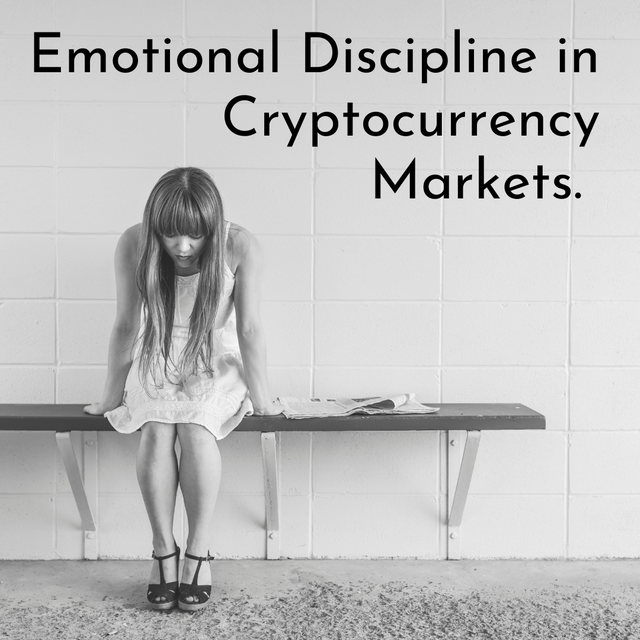SLC S22W1 : Mastering Trading Psychology: Emotional Discipline in Cryptocurrency Markets.
Assalam O Alaikum.
Hello my steemit friends i am excited to participate in this weeks contest which focuses on trading psychology. As someone deeply interested in learning and growing in different areas i believe emotional discipline is essential for success not just in trading but in life. Today i will explore key aspects of trading psychology including emotional triggers overcoming barriers building a trading routine and staying resilient in volatile markets. Lets dive in!
Identifying Emotional Triggers in Trading.
In trading emotions play a huge role in decision-making. Three common emotional triggers are fear greed and overconfidence.
Fear: Fear occurs when a traders worries about losing money for example during a markets crash traders might panic and sells their assets at a loss even if the market is likely to recover.
Greed: Greed happens when traders chase profits without thinking clearly. Imagine a trader holding onto Steem because its price keeps rising. Instead of securing their profits they risk everything hoping the price will rise more only to see it drop suddenly.
Overconfidence: Overconfidence can make traders ignore risks. For instances if a traders makes a few successful trades they might feel invincibles and invest recklessly in volatile assets leadings to losses.
Understanding these emotional triggers is the first step to controlling them.
Overcoming Psychological Barriers.
Overcoming barriers like the fear of missing out (FOMO) loss aversion and overconfidence is crucial for effective trading. Here are some strategies:
FOMO: Fear of missing out happens when traders see others making profits and jump into trades without proper analysis. To overcome this focus on your own strategy. For example if Steem/USDT prices rise quickly avoid rushing in. Instead analyze if the price increase is sustainable.
Loss Aversion: This occurs when traders hold onto losing trades hoping for recoverys instead of cutting their losses to managed this set stop-loss orders to automatically sells when a certain price is reached.
Overconfidence: Overconfidence can be controlled by always sticking to your plans and reviewing your mistakes keep reminding yourself thats past success does not guarantee futures results.
By using these techniques traders can make logical decisions and avoid emotional mistakes.
Developing a Trading Routine
A strong trading routine can help traders stay disciplined and emotionally prepared. Here’s an example of a daily and weekly trading routine:
Daily Routine:
Morning Preparation: Started the day by reading markets updates and settings your trading goals.
Mindfulness Practice: Spend 5-10 minutes meditating or practicing deeply breathing to stay calms.
Journaling Trades: Write down every trade you make including the reason for the trade and your emotions during it.
Weekly Routine:
Review Performance: Every week review your trading journal to identify patterns and mistakes.
Set Goals: Set realistic goals for the upcoming week. Focus on percentages instead of specific amounts such as aiming for a 2% profit on trades.
Educational Time: Dedicate time to learn new strategies or improve your understanding of Steem/USDT markets.
Following a consistent routine keeps emotions in check and improves decision-making over time.
Case Study on Emotional Trading.
Let’s look at an example where emotions led to a trading mistake:
Scenario: A trader sees Steem’s price rising quickly and decides to buy at $0.50 without proper analysis driven by FOMO. Soon after the price drops to $0.30 due to a market correction. Instead of selling and cutting their losses the trader holds onto Steem hoping for a recovery. However the price remains low and the trader loses a significant amount of money.
What Could Have Prevented This?
Emotional Discipline: The trader should have avoided impulsive decisions by analyzing the market first.
Setting Limits: Using a stop-loss orders at $0.45 could haves minimized losses.
Sticking to a Strategy: If the traders had a plans and followed it they could haves avoided FOMO and panics.
This example shows how emotions can leads to costly mistakes and highlights the importances of emotional disciplines.
Building Resilience in Volatile Markets.
Trading in volatiles markets can be stressful but resilience helps traders stay focused here are some tips for building mentals resilience:
Stay Informed: Keep up with market news but avoid overloading yourself with information that causes stress.
Take Breaks: Step away from trading when feelings overwhelmed a short breaks can cleared your mind and helpo you make better decisions.
Practice Self-Care: Eat wells exercises and get enoughs sleep to maintained your mentals and physical health.
Focus on the Long Term: Instead of worrying about daily prices fluctuations focus on your overall tradings goals.
By staying calm and prepared traders can handles the ups and downs of the market more effectively.
Mastering trading psychology is not just aboutt learning strategies its about understandings and controlling your emotions. By identifying emotionally triggers overcoming psychological barriers developing a routines and building resilience traders can improved their performance and avoid costly mistakes. Whether you are trading Steem/USDT or any other cryptocurrency emotionals discipline is the key to success.
I am inviting friends @wuddi @amjadali00 @hamzayousafzai


